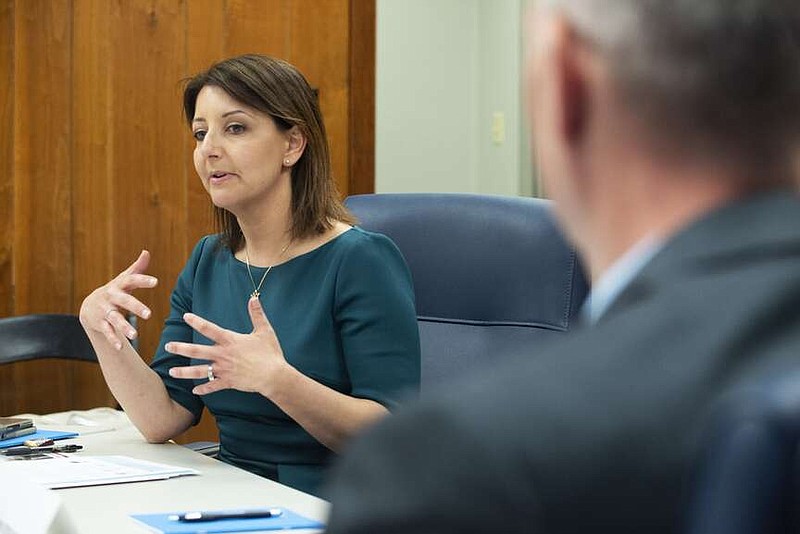Health initiatives throughout northwest Arkansas are focusing on community connection and cultural competency.
Center for Disease Prevention and Control Director, Dr. Mandy Cohen, spoke with regional healthcare leaders Monday afternoon about the state's needs and unique challenges.
Cohen, who formerly practiced as a doctor of internal medicine, said she is now focused on helping communities take a proactive approach rather than reactive.
She has visited many states since being appointed director in July 2023, but said Monday's trip was her first time in Arkansas.
The discussion featured Cohen, U.S. Representative Steve Womack, and members of Our Healthy Alliance, a nonprofit public health organization.
Many members of the alliance highlighted the power of community during the covid-19 pandemic and how this need continues.
Building trust among patients is one of the main goals, alliance members said. Yet, multiple approaches are needed due to the cultural diversity in northwest Arkansas.
Melisa Laelan, chief executive officer of Arkansas Coalition of Marshallese said the healthcare system can be intimidating for members of her community due to existing barriers. These include housing, food access and especially language barriers, she said.
Springdale is home to the largest population of Marshallese people outside of the Marshall Islands, according to Marshallese Educational Initiative. More than 12,000 Marshallese people live in Springdale according to its website.
Benetick Kabua Maddison, the nonprofit's executive director, and Laelan said they both agree that improving health outcomes for Marshallese people is important, but the covid-19 pandemic caused distrust in their community.
"As data has shown, covid-19 disproportionately impacted the Marshallese community here," said Maddison. "Through our partnerships with UAMS and with other grants supported by the CDC we were able to reach so many of our community members, educating them about keeping themselves safe, their families, as well as the importance of taking the vaccine once they were prepared."
He said while this helped, the impact of the pandemic cannot be forgotten.
Marshallese people accounted for 38% of reported covid-19 deaths in Washington and Benton counties between March and June 2020, according to the CDC.
Increasing health literacy is one of the ways to tackle this issue, said Pearl McElfish, Director of UAMS Community Health & Research. McElfish and her team focus on researching factors that impact the health of many Arkansas. These include maternal and child health, diabetic and cardiometabolic disease and health equity and access.
The organization began a community health worker program, which has trained 230 health workers since 2021, according to its 2023 report. These workers are deployed throughout the state, with 40 placed in Benton and Washington counties McElfish said.
Dr. Sonal Bhakta, an doctor of internal medicine at Mercy Clinic in Rogers said bilingual community health workers were intergral to operations in the covid units as they helped translate in real time. She said this allowed families to understand what was happening and help build trust when language barriers existed.
Zuzuky Monarez, anchor for Telemundo Arkansas said many Hispanic people do not know about all the health resources available to them, but that community health workers can help.
She said many Hispanic people approach healthcare cautiously when they cannot connect with people from their same background. Research and community health initiatives are improving this, she said.
Cohen said one of her goals is to make sure people know the CDC can be utilized for all types of public health information, not just facts about covid-19. Funding from the CDC helps support programs such as community health workers, she said, as around 80% of funding received by the agency goes out to local communities.
Cohen said the focuses in Arkansas should include lowering maternal mortality rates, increasing rural healthcare access and continuing to work on cultural competency in medicine.
"It was great to see here at Community Clinic that UAMS is bringing together a coalition to make sure that we are building trust between the Marshallese community and Hispanic community," Cohen said. "What's going on in public health and healthcare is so important. It was great work that was established in the time of responding to the pandemic, but there are other health issues and threats now."
